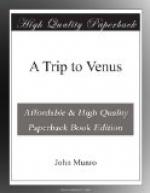I wrung his hand in silence.
“Now let us take a look through the telescope,” he went on, wiping his eyes, and adjusting the instrument. “You will see how soon it gets out of focus. We are flying from Mercury, my friend, faster and faster.”
It was true.
“But I don’t understand how that should be,” said I. “The firing ought to have had a contrary effect.”
“The rifles are not to blame,” answered Gazen. “If we had used them earlier we might have saved ourselves. But all the time that we were discussing ways and means, and making our preparations to shoot, we were gradually drifting towards the sun without knowing it. We overlooked the fact that the orbit of Mercury is very far from circular, and that he is now moving further away from the sun every instant. As a consequence his attractive power over the car is growing weaker every moment. The car had reached the ‘dead-point’ where the attractive powers of the sun and planet over it just balanced each other; but as that of the planet grew feebler the balance turned, and the car was drawn with ever accelerating velocity towards the sun.”
“Like enough.”
“I can satisfy you of it by pointing the telescope at a sun-spot,” said Gazen, bringing the instrument to bear upon the sun. “You will then see how fast we are running to perdition. I say—what would our friends in London think if they could see us now? Wouldn’t old Possil snigger! Well, I shall get the better of him at last. I shall solve the great mystery of the ‘sun-spots’ and the ‘willow leaves.’ Only he will never know it. That’s a bitter drop in the cup!”
So saying, he applied his eye to the telescope, his ruling passion strong in death. For myself, as often as I had admired the glorious luminary, I could not think of it now without a shudder, and fell a prey to my own melancholy ruminations.
So this was the end! After all our care and forethought, after all our struggles, after all our success, to perish miserably like moths in a candle, to plunge headlong into that immense conflagration as a vessel dives into the ocean, and is never heard of more! Not a vestige of us, not even a charred bone to tell the tale. Alumion—our friends at home—when they admired the sun would they ever fancy that it was our grave—ever dream that our ashes were whirling in its flames. The cry of Othello, in his despair, which I had learned at school, came back to my mind—“Blow me about in winds! Roast me in sulphur! Wash me in steep-down gulfs of liquid fire!”
Regrets, remorse, and bitter reflections overwhelmed me. Why had we not stayed in Venus? Why had we come to Mercury? Why had we endeavoured to do so much? What folly had drawn me into this mad venture at all? No, I could not say that. I could not call it folly which had brought me to Alumion. I had no regret, but on the contrary an unspeakable joy and gratitude on that score. But why had we attempted to approach so near the sun, daring the heat, which had jammed our engines, and disabled our best intellect; risking the powerful attraction that was hurrying us to our doom?




